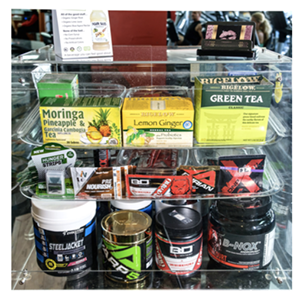Top 6 Nutritional Supplement Myths

More than three fourths of American adults took a dietary supplement last year. That’s more than EVER before!
While taking the right dietary supplement (under the right conditions, in the right dosages) can help supply your body with nutrients it needs for optimum health, misconceptions are common.
Below, we list six of the most pervasive supplement myths, and share how to stay healthy and benefit from the supplements you may need.
MYTH 1
Supplements Are Approved By The FDA
Actually, a supplement company can sell a non approved product. The FDA only gets involved if adverse effects are reported AFTER the product has been on the market. People assume products are safe because all the bad products have been removed from the market. Supplements may be safer than they were twenty years ago, but that doesn’t guarantee that there won’t be products introduced that are damaging over time, or to you individually.
MYTH 2
Most People Need To Take Supplements
Most adults can get all their nutritional needs through a well balanced and healthy diet full of fruits, vegetables, healthy proteins and fats, and whole grains. However, in cases of deficiency that cannot be corrected through food alone, taking specific supplements containing nutrients your deficient in based upon blood work, medical and family history, may fill the gaps.
MYTH 3
More Supplementation Is Always Better
The fat soluble vitamins, A, D, E and K have the ability to be stored in the body so they pose the biggest threat for toxicity. Water soluble vitamins B and C are typically excreted in urine when they are ingested in excess. However, it is still possible to develop a toxicity, and tolerable upper limits exist for that reason. Typically, it’s not required to to take any more than the recommended daily amount. However, in some cases, as recommended by a health care provider, more than 100% of the RDA (recommended daily amount) may be required and perfectly safe.
MYTH 4
Supplements Never Interact With Drugs
There are some supplements, especially herbals, that can interfere with medications, making the meds more of less effective. Taking some medications and supplements together could cause unwanted side effects. For example, taking antibiotics and probiotics together will cause the antibiotics to kill the probiotics resulting in taking only a cellulose capsule.
MYTH 5
Supplements Always Contain What Their Labels Say
A supplement can claim it contains 100% of your RDA needs, but in fact it can contain as little as 10%. When choosing supplements, opt for ones that have undergone third party testing, to ensure there is noting in the product that’s not listed on the label, such as heavy metals or other contaminants.
In one 2012 study, only 12 percent of supplements investigated were certified by an independent scientific agency. Finding supplements that are third party tested can prove challenging, bus it IS doable. Any product that has undergone third=party testing will say so on its label. Keep in mind that these organizations also have online directories of the supplements they have certified.
MYTH 6
Supplements Always Do What They Say They Do
Supplements can improve health in those with deficiencies, but not every available supplement carries the benefits it claims. Currently, dietary supplements cannot lawfully claim to treat or prevent a disease, according to the FDA. However, some companies skirt the line of what is allowed. Seeing claims on a bottle, or in an advertisement, doesn’t mean they are supported. The label should explain that these claims have NOT been evaluated by the FDA.
Olympia Gym’s Top 10 Supplements to implement
#1 Fish Oil/Omega 3 Fatty Acids
This is an essential fat meaning your body can’t produce it so you have to get this from your diet. Even if you eat fish 1-2 times per week, you won’t be getting enough Omega-3’s to meet your needs. Omega-3’s may:
- Reduce triglycerides
- Lower risk of heart disease Improve recovery from exercise Protect brain health
- Lower risk of diabetes
- Look for a brand providing a minimum of 2g of EPA/DHA per day.
#2 Vitamin D
Numerous studies show that most Americans have less than the optimal levels of Vitamin D. Not surprising—- it’s tough to get it from food (although canned salmon, milk and sardines are good sources). The only other method is sunlight. But even when outside, most people are covered with clothing and/or sunscreen. Most experts agree to supplement with at least 1000 IU’s daily.
#3 Whey Protein
This is not an essential supplement, but it supplies high levels of branched chain amino acids which aids in workout recovery, and building/repairing muscle tissue. Whey protein also helps build our immune system. It’s a quick, convenient source of quality calories when combined with fruit or nut butter in a shake, or mixed into baking products.
#4 Greens Supplements
Less than 6 percent of men and 9 percent of women age five to thirty-four consume to recommended minimum five servings of fruits and vegetables each day. Greens supplements can help fill that void. Greens supplements are a good ‘insurance policy’ if produce consumption is less than ideal, or during times of heavy travel.
#5 Probiotics
There are millions of different types of bacteria in our digestive tract helping us breakdown our food into nutrient components. Some good, others, not so much. These bacteria can influence our overall health, digestion and immune system. Probiotics can replenish and nourish the supply of good bacteria. Aim for a product from a trusted brand that supplies at least 3 billion organisms per serving, and keep it refrigerated after opening.
#6 Turmeric (Curcumin)
Curcumin (a key component of turmeric)possesses a wide range of beneficial health properties. A 2010 study found that curcumin had anti-cancer, anti-viral, anti-arthritic and anti-inflammatory properties. Find a curcumin supplement that delivers around 500 mg daily.
#7 Cinnamon
Cinnamon has one of the highest antioxidant level of any spice. Several studies have shown that it may improve insulin sensitivity, which improves how carbs are used by the body, and leads to better blood-sugar control. About one gram daily (1/2 teaspoon) is sufficient. Note: cinnamon comes in two varieties: Ceylon and cassia. The most benefits have been linked to the cassia variety.
#8 Psyllium
Psyllium is a soluble fiber that can help regulate blood sugar in people who have diabetes, and help regulate digestion/ elimination in the rest of us. If you choose to supplement with psyllium start with a small amount and build up over time. Adding too much fiber, too quickly, can lead to some ‘uncomfortable’ side effects.
#9 Creatine
Creatine has stood the test of time. It is one of the most extensively studied supplement. To date, most experts agree – it works. It may enhance muscle function during high intensity exercise and cause muscle hypertrophy (growth), likely due to increased water retention by muscle cells. Some data also suggests there may be gains in muscle fiber diameter as well. Vegetarians may have greater response because of their limited intake of dietary creatine. While some advocate creatine loading, it isn’t necessary. Adding three to five grams daily can help improve strength, or speed, or help add muscle tissue.
#10 Beta-Alanine
Research has linked this amino acids performance improvements. Muscle cells use alanine to form carnosine, which helps cells reduce fatigue.
BONUS SUPPLEMENT – CoQ10
CoQ10 acts as a biological catalyst for fundamental cellular processes. It provides the energy necessary to allow chemical reactions necessary for life to take place by helping to form ATP. It also acts as an anti-oxidant to protect cells from oxidizing. It’s found naturally in meats, soy oil, sardines, mackerel and peanuts. There are two forms of CoQ10 – ubiquinone and ubiquinol. Both are useful to the body, but some studies indicate older adults may benefit more from ubiquinol, while younger people may benefit more from ubiquinone.
Olympia’s Juice Bar Offers Nutritious Meals Plus MUCH MORE!

With our busy schedules and multi-tasking lifestyles, creating healthy meals is often placed on the back burner. We KNOW that at least eighty per cent of the gains we’re going to get at the gym come from how well we fuel our bodies. Olympia’s Juice Bar has that handled,,, seriously! Each day nutritious balanced meals are prepared and available to either eat there or be delivered to your home or office. It’s an affordable, convenient way to eliminate that excuse of being “too busy to cook!”

Personal Trainer Spotlight
Olympia Welcomes Jenna Z. To The Team!
Education meets passion meets personality! She’s the total package. Seriously!
Former gymnast/cheerleader and now athlete, coach, 6 year experienced NASM Certified Personal Fitness Trainer and Fitness Nutrition Specialist… WHEW!
During college, Jenna, who has always led an active lifestyle, noticed some unwanted weight, and a lack of energy. Being diagnosed with ADD and depression was NOT going to stop her! She researched natural medicine and nutrition, made some modifications, and reversed her situation. In the process she became obsessed with natural medicine, performance and the human spirit.
Jenna ‘nourishes’ the mind, body and spirit of her clients. Her infectious energy is fueled by seeing her clients’ confidence and self love grow!

